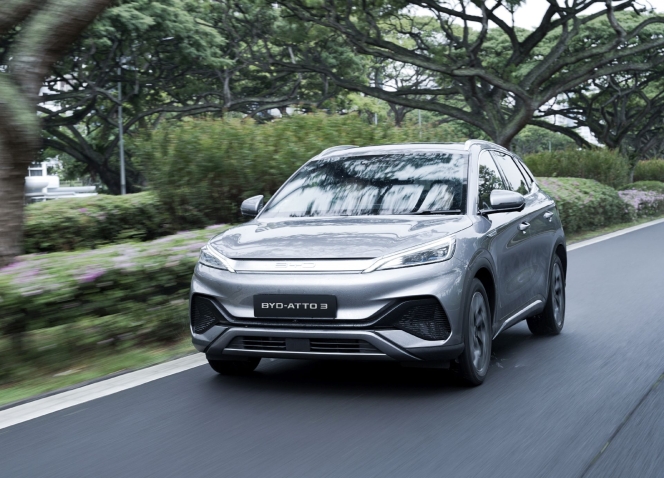
Toyota made a splash in India recently by showcasing a flex-fuel hybrid vehicle. This amounted to a logical step in its efforts to highlight its work in the area of alternative fuel technologies soon after it supplied the Union Transport Minister, Nitin Gadkari, with a hydrogen fuel cell car. The year 2022 has been a year of much action and words in the area of alternative fuels in India. The Brazilian Ambassador to India, d. Andre Aranha Correa Do Lago, said in his speech at the recent SIAM Annual Convention that Brazil and India are the two largest sugarcane producers and have the potential to produce enormous amounts of ethanol. “Brazil will work with India on flex-fuel technology, sustainable aviation fuels, second generation ethanol, hybrid flex-fuel vehicles, fuel cells etc.,” he averred.
At the same event, Gadkari mentioned that through innovation, science, research, technology and entrepreneurship, the auto industry should convert knowledge to fuel and devise alternative fuel technologies. Stating that the petroleum product import is amounting to INR 16 trillion and is a challenge for the country, he averred, “I am happy to see good growth of electric vehicles across segments. Around 1.5 million EVs have been registered and the overall sales figure is up by 162 percent. The sales growth of electric two-wheelers is 425 percent, electric three-wheelers is 75 percent, electric four-wheelers is 230 percent and electric buses is 1,600 percent. The number of new start-ups in the domain is 250.” In October 2022, Chinese electric automaker BYD announced the launch of its second electric vehicle in India in the form of an electric SUV called the Atto 3. It will commence sales starting January 2023.
As electric vehicles continue to gain strength across segments, it is the two-wheeler segment that seems to gain in sales numbers the most. No surprise then that Taiwanese electric two-wheeler major Gogoro is expected to launch electric scooters in India soon. The company has been having a tie-up with Hero MotoCorp in India for some time now and the two are said to be working on developing a battery swapping technology that is suitable for the local and regional requirements. Hero MotoCorp and Gogoro are not the only ones; there are other companies too – like Sun Mobility – that are already working on battery swapping technology.
With the need for smart grids and a battery charging infrastructure growing as part of the thrust towards alternative fuel technologies to achieve net-zero carbon emissions, the question being asked is: which alternative fuel technology will finally triumph with efforts being made in various areas and directions? A portion of the auto industry is betting on hydrogen as the ultimate alternative fuel. Another portion of the industry is betting on flex-fuel and other alternative fuel technologies, including various gases like LNG and CNG.
With countries like Russia banking on gaseous fuel as a means to reduce carbon emissions since they are available in abundance there, it is countries like India, which imports 85 percent of the fuels, that needs to find out what it has in abundance and select as the alternative fuel of choice, mentioned an industry expert from Europe. He added that a unique alternative fuel technology from India could actually lead to a global breakthrough and help mobility advance in a new direction altogether. With the possibility of such a disruption always present, the current situation is looking a bit unorganised with a variety of alternative fuels being taken into consideration.
On one hand, CNG stations are being increased and commercial vehicle operators are taking to it, while on the two-wheeler level, it is the electric vehicle technology that is gathering pace. The most diverse are the efforts at the passenger car level, where Maruti Suzuki and Toyota seem to look at hybrid and flex-fuel, whereas the ones like BYD, MG and Tata Motors are looking at electric to go net-zero carbon. The investment in BS VI technology, which promised water at the tailpipe through emissions cleaner than the air, is yet to fructify for some or many automakers and the call for rapid development in alternative fuel technologies is being summoned.
With sustainability being the mantra as the auto industry in India sees good days after a prolonged slowdown, the high inflation and resulting steep increase in vehicle prices is already threatening to spoil the party. A point of worry being that if the work on alternative fuel technologies is affected as inflation is likely to bite harder in 2023, the need to keep global temperatures from rising above the 1.5-degree Celsius mark stays. The auto industry is expected to contribute the most and also ensure sustainable, affordable and desirable mobility at the same time. A tightrope walk beckons as the mantle of alternative fuel technologies can’t be abandoned.
One thing is clear that what holds for India is what India has in abundance. Like Russia has gas, India could do well in developing technologies that can create gas from waste and other means available locally in abundance. Rather than politicising city waste that is often dumped just outside the city, it will serve if it could be turned into fuel to power automobiles as well as industrial furnaces and other machines. Afterall, despite all the efforts in electrification and other alternative fuel technologies, roughly 95 percent of the vehicles that continue to sell the world over are still powered by IC engines!
- Eicher Trucks and Buses
- VE Commercial Vehicles
- VECV
- India Book of Records
- IBR
- Eicher Pro X
- Vinod Aggarwal
- SS Gill
- Abhishek Chaudhary
Eicher Pro X EV Completes Kashmir To Kanyakumari Journey In 6 Days
- By MT Bureau
- January 28, 2026
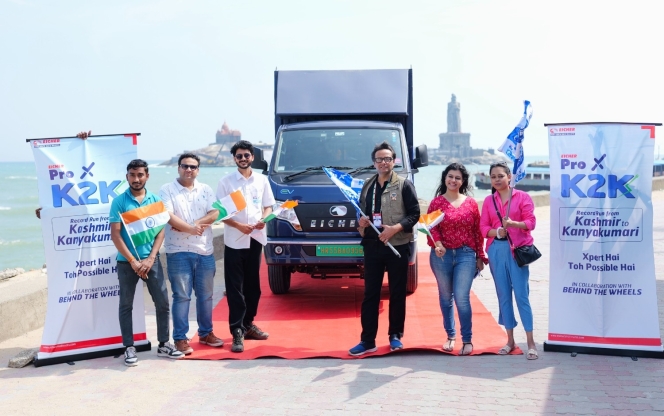
Eicher Trucks and Buses, part of VE Commercial Vehicles (VECV), has completed a journey from Kashmir to Kanyakumari using its Eicher Pro X EV.
The record verified by the India Book of Records (IBR), saw the electric vehicle cover over 4,000 kilometres in 6 days under loaded conditions. The run commenced in Srinagar on 20 January 2026 and concluded in Kanyakumari on 26 January 2026, traversing the Himalayas, plains and the Deccan Plateau.
Throughout the expedition, the vehicle utilised public chargers located via the MyEicher App. An adjudicator from the India Book of Records accompanied the truck to monitor route compliance, load, distance and charging stops. The mission served as a demonstration of electric vehicle endurance across diverse altitudes and climates to validate the technology for logistics corridors.
The journey was intended to show that electric commercial vehicles can operate beyond short-haul deliveries. By maintaining performance across hilly and coastal routes, the Pro X EV aimed to establish total cost of ownership (TCO) benefits and maintenance predictability for fleet operators. The successful completion of the route suggests that current charging infrastructure can support long-haul electric freight movement.
Vinod Aggarwal, MD & CEO, VE Commercial Vehicles, said, “For more than four decades, Eicher trucks and Buses have earned customer trust through leadership in fuel efficiency and application-specific engineering. The record-setting performance of the Eicher Pro X reinforces our unwavering focus on application excellence, reliability, and performance, anchored in robust product development and manufacturing capabilities, and enabled by a customer-centric, pan-India commercial and dealer network. I commend the entire Eicher team for achieving these well-deserved records”.
SS Gill, Chief Commercial Officer, VE Commercial Vehicles, said, “By covering the K2K route with a loaded Pro X EV, Eicher Trucks & Buses has proven that electric mobility is no longer restricted to short-haul, ‘last-mile’ deliveries. We are not just setting records, but through the strength of our service network and extensive dealer set-up, we are demonstrating that our EV technology is commercially viable, reliable, and has the range to serve as the backbone of India’s green logistics corridors”.
Abhishek Chaudhary, SVP – SCV Sales & Marketing, VE Commercial Vehicles, said, “The Eicher Pro X EV was put to the ultimate test – covering over 4000 kilometres across diverse climates and challenging altitudes. With this recognition from the India Book of Records we’ve moved beyond our own stringent testing benchmarks to real-world validation - Demonstrating that Eicher Pro X EV is a dependable partner for logistics movement across varied operations in India”.
- Montra Electric
- Murugappa Group
- PM E-Drive Scheme
- Rhino 5538 EV 6x4 Tractor trailer
- Narendra Modi
- H D Kumaraswamy
- Arun Murguappan
- Sathia Raj
- UltraTech Cement
Montra Electric Becomes First OEM To Receive PM E-Drive Certification For Heavy Trucks
- By MT Bureau
- January 28, 2026
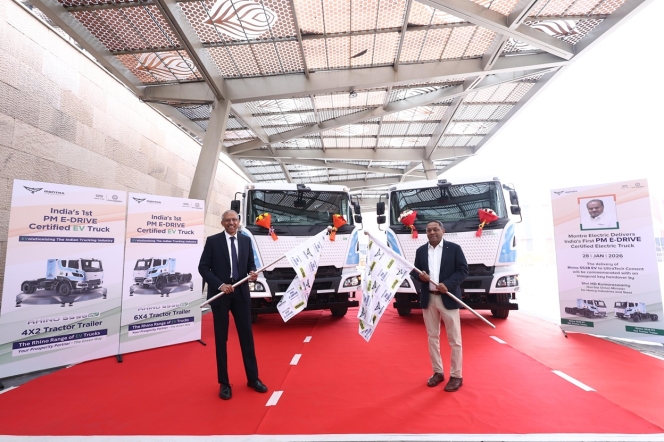
Montra Electric, the electric medium and heavy commercial vehicle business of the Murugappa Group, has become the first manufacturer in India to receive certification for heavy-duty electric trucks under the government's PM E-Drive Scheme.
To mark the achievement, the company delivered a Rhino 5538 EV 6x4 Tractor trailer to UltraTech Cement. The handover took place in the presence of Arun Murugappan, Chairman of Montra Electric and Sathia Raj, Chief Procurement Officer of UltraTech Cement.
The PM E-Drive scheme includes a budget of INR 5 billion specifically for electric trucks, providing a benefit of up to INR 960,000 per vehicle for the Rhino 5538 EV. This incentive is intended to lower operating costs and reduce exposure to fuel price volatility for fleet operators in the logistics, mining, and manufacturing sectors. The Rhino 5538 EV range is designed for Indian conditions and is available in 6x4 and 4x2 variants.
The Rhino 5538 EV 4x2 variant features a 282 kWh LFP battery that produces 380 HP and 2000 Nm of torque. It offers a range of approximately 198 km under standard test conditions and supports six-minute battery swaps. These specifications suit the vehicle for high-utilisation applications in ports, steel plants, and cement logistics.
H D Kumaraswamy, Union Minister for Heavy Industries, said, "The PM E-Drive scheme is a testament to the growing prowess of Indian innovation in the heavy-duty electric vehicle segment. Under the visionary leadership of Prime Minister Narendra Modi, we are committed to decarbonizing our logistics and making India a global hub for EV manufacturing. Electric trucks are pivotal to our Net Zero goals, and by fostering a self-reliant ecosystem through such certifications, we are driving the spirit of Atmanirbhar Viksit Bharat. We are very happy to see our Prime Minister’s vision coming to life with the 1st PM E-Drive certified heavy duty electric truck from 'Montra Electric' getting delivered today."
Arun Murugappan, Chairman, Montra Electric, said: “Decarbonising freight is one of the most critical challenges in India’s energy transition. We are grateful to the Government of India and our Prime Minister Narendra Modi for introducing forward-looking and progressive policy frameworks such as the PM E-Drive Scheme, which represent a welcome and transformative step in accelerating this shift, particularly in heavy commercial vehicles where emissions intensity is high. At Montra Electric, we are proud to contribute to this national mission by delivering technologically advanced, reliable, and scalable electric M&HCV solutions that can drive meaningful and lasting change in India’s mobility ecosystem.”
- Chartered Speed
- EKA Mobility
- PM E-Drive Scheme
- Bengaluru Metropolitan Transport Corporation
- Sanyam Gandhi
- Rohit Srivastava
- electric bus
Chartered Speed And EKA Mobility To Deploy 1,750 Electric Buses In Bengaluru
- By MT Bureau
- January 28, 2026
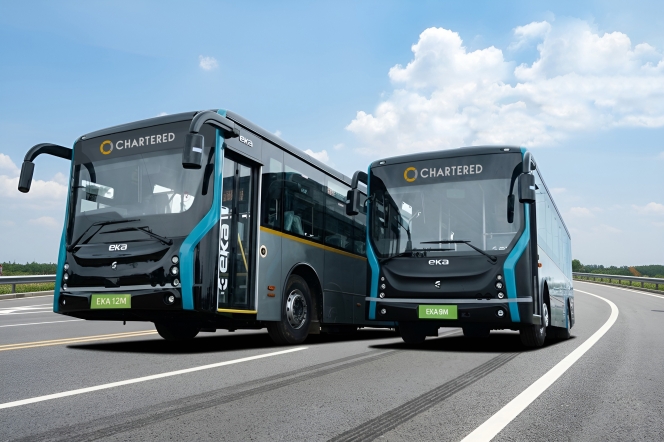
Chartered Speed and EKA Mobility have received a Letter of Confirmation of Quantity (LOCQ) to deploy 1,750 electric buses in Bengaluru under the PM E-Drive Scheme. This allocation accounts for approximately 39 percent of the city's total planned induction of 4,500 electric buses. The initiative is part of the Bengaluru Metropolitan Transport Corporation effort to expand its network in line with the decarbonisation roadmap of the Government of India.
The partnership combines the operational services of Chartered Speed with the vehicle manufacturing and technology of EKA Mobility. Operational protocols for the fleet include maintenance, battery monitoring, and driver training. Chartered Speed has stated its intention to transition 25 percent of its total fleet to electric power by Fiscal 2027.
The deployment aims to support public transport infrastructure in the region through investments in charging and maintenance facilities. Bengaluru is currently expanding its electric transport capacity to meet state mobility targets. The project focuses on providing urban transport solutions for the city's commuter base while reducing the carbon footprint of the public system.
Sanyam Gandhi, Whole-Time Director, Chartered Speed, said, “Bengaluru is a key mobility hub in India, and electric buses are part of the efforts to build a cleaner and more efficient public transport system. The PM E-Drive allocation strengthens Chartered Speed Limited’s long-term commitment to sustainable mass mobility. As one of the early adopters of e-mobility, we aim to convert around 25% of our fleet to electric by Fiscal 2027, supported by strong infrastructure investments to deliver commuter-centric services aimed at lasting socio-economic impact.”
Rohit Srivastava, Business Head & Chief Growth Officer, EKA Mobility, added, “The PM E-Drive initiative is a powerful enabler of India’s electric mobility vision, and Bengaluru’s large-scale adoption of electric buses sets a strong benchmark for urban transport transformation. At EKA Mobility, we are proud to partner with Chartered Speed and contribute to Bengaluru’s journey towards a more sustainable urban future. It is not just about scale, but about creating cleaner mobility solutions, quieter streets, and a better daily commute for millions.”
Suzuki Opens Second Biogas Plant In Gujarat
- By MT Bureau
- January 20, 2026
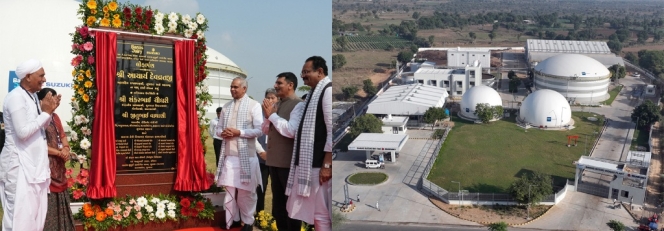
Suzuki Motor Corporation and its subsidiary, Suzuki R&D Centre India (SRDI), have inaugurated the Banas Suzuki Biogas Plant in Bhukhala, Gujarat. The facility, which opened on 18 January 2026, is the second such plant following the Agthala site that commenced operations in December 2025.
The plant is designed to process up to 100 tonnes of cow dung per day to produce approximately 1.5 tonnes of biogas. This output is equivalent to the daily fuel requirements of 850 compressed natural gas (CNG) vehicles. In addition to fuel production, the facility will sell organic fertiliser generated as a byproduct of the process.
The project is part of an agreement signed in September 2023 between SRDI, the National Dairy Development Board (NDDB) and Banas Dairy. The partners have agreed to construct a total of five biogas plants in the region. The Bhukhala site covers an area of 27,000 square metres and forms a component of Suzuki’s strategy to support carbon neutrality in India.
The use of biogas serves as a carbon-neutral alternative for CNG vehicles, which currently represent 20 percent of the Indian passenger car market. Beyond emission reductions, the initiative is intended to improve energy self-sufficiency and increase rural income through the purchase of cattle waste from local farmers.
The opening ceremony was attended by Acharya Devvrat, Governor of Gujarat and Shankar Chaudhary, Chairman of Banas Dairy and Speaker of the Gujarat Legislative Assembly. Representing Suzuki was Kenichiro Toyofuku, Managing Officer and Executive General Manager of Biogas Operations.
The company stated that it will continue to develop its biogas business to contribute to national growth and environmental targets. The operation is expected to create jobs within the district while providing fuel for high-demand vehicle segments.







Comments (0)
ADD COMMENT